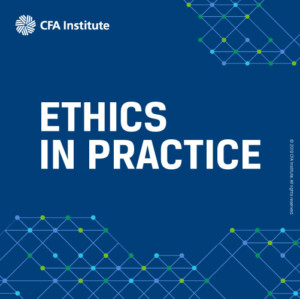Ethics in Practice: Corporate Bond Trading. Case and Analysis–Week of 1 July
Check out the analysis to see how you did in analyzing this week’s case (1 July) and determining which CFA Institute Standard was involved.
Case
Danaher works as a corporate bond broker for AFB Financial (AFB), an interdealer broker that only trades dealer to dealer. Danaher and AFB’s other brokers are paid entirely by commissions and deal only with large banks, institutions, and other dealers, not with retail investors. AFB does not take positions in any securities and executes trades in a matched principal capacity. One of Danaher’s biggest and most demanding accounts is that of NOVA Capital. NOVA is represented by Elliott who works on NOVA’s corporate bond trading desk. NOVA requires a capital reserve for bond positions that age more than 180 days (aged inventory) and charges that reserve against Elliot’s inventory book. Aged inventory cash reserves affect the profit and loss calculations of Elliot’s proprietary account and, as a result, reduce Elliott’s compensation.
At Elliott’s request, Danaher agrees to occasionally purchase bonds from NOVA and sell back the same bonds later in the day. Danaher understands that these trades allow Elliott to “reset the clock” to avoid aged inventory reductions in the profits of the proprietary account he manages for NOVA and to avoid negative effects to his compensation. Danaher does not immediately reverse the trades but holds these securities for four to six hours during the day. He also does not sell NOVA’s bond positions to another firm before selling them back to Elliott and NOVA at the original price.
Danaher’s actions are
- inappropriate.
- appropriate because he is executing the trades in the time and manner requested by his client.
- appropriate because the four to six hours between trades creates market risk.
- appropriate because Elliott and NOVA are sophisticated institutional clients that are expected to have full knowledge and understanding of their trading strategy.
- none of the above.
Analysis
This case relates to misconduct, violation of the law, and loyalty to clients. The CFA Institute Standards of Professional Conduct prohibit members from engaging in any professional conduct involving dishonesty, fraud, or deceit (Standard I(D)), require members to refrain from participating in legal or ethical violations (Standard I(A)), and require members to place their client’s interests before their own interest (Standard III(A)). In this case, NOVA is a client of AFB, and Danaher is AFB’s employee handling that account. Danaher understands that Elliott, NOVA’s representative who is responsible for managing the firm’s account with AFB, is engaged in a fraud against his employer.
Although there would be no issues with a customer buying and selling the same security on the same day, provided the customer assumed market risk, such risk is not established by how long a party holds a position. In this case, there was no market risk because Danaher never sold NOVA’s positions to another firm before selling them back to NOVA at the same price. To placate Elliott, Danaher agrees to assist Elliott in fraudulently updating the “age” of Elliott’s corporate bond inventory on NOVA’s books so that Elliott will not be financially penalized. These trades are not truly at the request of the client but rather are executed on behalf of a duplicitous employee. Furthermore, in meeting this request, Danaher knows that NOVA will have to pay AFB commissions for non-bonafide transactions in which there was no beneficial change in ownership. Danaher personally benefits from these transactions because he receives a portion of AFB’s commissions on the trade as compensation. By assisting in this fraud against NOVA, Danaher fails to protect the interest of his client. The fact that NOVA is a sophisticated investor that fails to discover its own employee’s deceitful and fraudulent activity, does not excuse Danaher’s misconduct. Choice A is the best choice.
This case is based on a June 2019 Financial Industry Regulatory Authority Enforcement Action.
Let us know what you think of Ethics in Practice by taking this short survey.
Have an idea for a case for us to feature? Send it to us at [email protected].
More About the Ethics in Practice Series
Just as you need to practice to become proficient at playing a musical instrument, public speaking, or playing a sport, practicing assessing and analyzing situations and making ethical decisions develops your ethical decision-making skills. The Ethics in Practice series gives you an opportunity to “exercise” your ethical decision-making skills. Each week, we post a short vignette, drawn from real-world circumstances, regulatory cases, and CFA Institute Professional Conduct investigations, along with possible responses/actions. We then encourage you to assess the case using the CFA Institute Ethical Decision-Making Framework and through the lens of the CFA Institute Code of Ethics and Standards of Professional Conduct. Then join the conversation and let us know which of the choices you believe is the right one and explain why. Later in the week, we will post an analysis of the case and you can see how your response compares.
Image Credit: ©CFA Institute


Option A best describe the case as Danaher’s action is inappropriate because she is manipulating the market. Market manipulations is a practice that negatively impact market integrity.